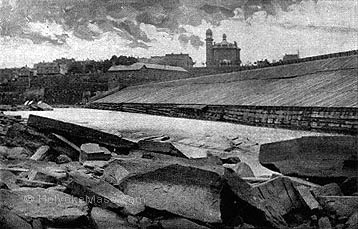One of the men who used to stop at Crafts’ tavern was "Uncle" Howland Ames. He had a little cotton mill up at Conway, and used to do the teaming for it himself. On the down trip he would carry a load of cloth, and coming back would bring a few bales of cotton. He was economically inclined and used to carry oats for his horse, and in a stout, wooden bucket, sufficient food for himself. Thus he had only to pay for barn room and hay for his team, and a bed for himself. When supper time came, he would draw up to the bar-room stove and eat his lonely meal, and then stow his bucket in the corner till he went to it again for breakfast. Among other things, he always carried a roasted chicken on these trips. One night the boys—partly as a joke, partly as a hint that they thought this manner of getting along altogether too cheap—cleaned out the chicken and left only the bones behind in the bucket. The old gentleman made no remark when he discovered the havoc played with his chicken, but after that took his box to bed with him.
Crafts’ tavern was, in those days, the post office of the place. Mail arrived twice a day—from the south at ten in the morning, and from the north at two in the afternoon. There was a mail delivery, also, at the little store down by the river, it being the custom to send up to the tavern after it.
Looking down upon the river from the hill, there were almost always several river boats in sight, either with sails spread, making their slow way up or down the placid stream below the rapids, or struggling along the shore on their way up to the canal, which led around the falls to regions farther north. These boats were low, square, flat-bottomed crafts, with a little cabin at the rear, and a stout mast forward, on which was hoisted, when the wind favored, a big square sail. When the wind did not favor, or died out into calm, the boats were propelled with poles. They brought up the river cargoes of sugar, tea, flour, rum, and other supplies,

The Dam in a Dry Time
|
Rufus Robinson Rows Over the Dam
and carried back wood, wooden ware, brooms and country produce in general. Merchandise for Holyoke was unloaded at Jedediah Day’s landing which was on the river near the present village of Springdale. The landing was commonly known as "Jed Day’s," or "Diah Day’s." In times of low water, the larger boats bound up the river were obliged to stop here. Sometimes the cargoes were transferred to lighter crafts, but often were unloaded and teamed to the river company’s storehouse at Northampton. "Uncle" Whiting Street was one of the owners of the river carrying trade, and was local agent. When a boat was obliged to stop at Ireland Parish, instead of continuing up the river, he would go through the village and call upon the farmers to be ready with their teams to cart the produce to Northampton the following morning. Nearly every farmer in the village had two yoke of oxen and one or two horses, and they were ready to drop anything to earn a little money with their teams. Oxen were always used for these short summer trips, but for the longer winter journeys horses were substituted. Sometimes a dozen of these slow-moving ox teams could be seen at once wending their way toward Northampton.
|